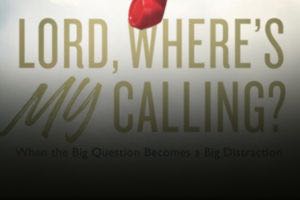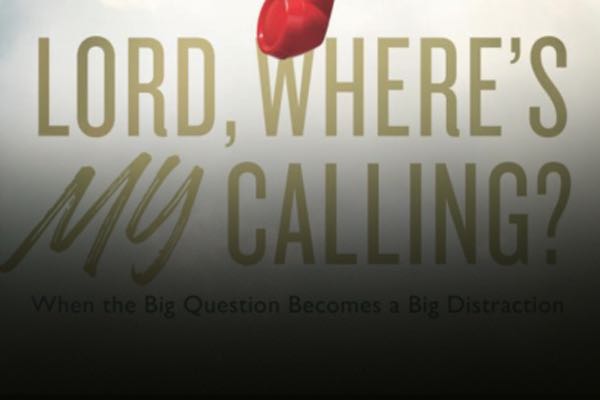
J. Warner Wallace:
Teasi, I know you have a deep interest in Christian apologetics. What was your purpose in writing this book?
Teasi Cannon:
My purpose in writing this book is really two-fold: first, as a thank you to God for how faithful He’s been—patiently continuing the work He’s begun between my ears. And second, to help others who feel deflated or even completely depressed because they can’t seem to identify their special calling. Many of us have been led to believe it’s out there…our mountain-moving, kingdom-changing call to action that will one day, most certainly, be hand-delivered by the heavenly host complete with fanfare. But nothing even remotely close to that ever happened for me—hasn’t to this day. And that’s totally fine…at long last. You see, for years (and years), not knowing my big calling held me back. In fact, I didn’t believe my life was truly going to start until I got the answer to that daily (and sometimes hourly) prayer, Lord, where’s my calling? Normal things like having babies, teaching 7th graders in a public school, or helping with various ministries at church, sadly, never felt like enough. They always felt like warm-ups…or training ops for the day when it would finally come. And because of that, I lived as a horizon watcher…missing the flowers blooming right at my feet. But, I’m missing them no more. Not because I finally got what I was asking for, but because I’ve got something far better. In fact, I’ve had it all along, and my prayer is that once readers discover they’ve had it all along too, they’ll feel relieved, encouraged, and even inspired.
J. Warner Wallace:
In your book, you make a distinction between calling and purpose. How are they different?
Teasi Cannon:
Yes, I would consider recognizing the significant distinction between these two words one of the most transformative ah-hah moments of my life. Before seeing it, I’d always assumed purpose and calling were synonymous. In fact, I always heard them discussed or taught as if they were the same—not only in definition, but in importance. Which is why I never noticed my priorities were all mixed up. The line was so blurred that I couldn’t see which one should come first in my heart and mind. Until God used the dictionary to set me straight. When I looked up the definitions, what I found for calling was this: the work a person does or should be doing; a vocation or profession. When I looked up purpose, this is what I found: the reason for which something exists or is done, made, or used. Basically, my calling is the work I do, my j-o-b; whereas my purpose is the reason for which I exist. One is about doing, the other about being. Not the same at all. I definitely don’t want the work I do to be the reason I exist, and I’m thankful that it’s not. In the book, I share some analogies involving highly intellectual things such as vacuum cleaners and flying carpets to further illustrate the difference, and then look at what the Bible says about the primary reason for which God made humans. Turns out our purpose is pretty incredible and is never reliant upon a calling (which can come and go and change several times in a lifetime). Ever since I switched from having a calling-focused life to a purpose-focused life, I no longer go to bed at night aching for some important assignment. I can put my head on the pillow every night knowing I’ve successfully lived the reason for which I was created…even if I never left the house.
J. Warner Wallace:
In the sub title of your book you say the big question can become a big distraction. What do you mean by that?
Teasi Cannon:
Well, we all wonder what we’re supposed to do with our lives, and as Christ-followers we specifically want to know what God wants us to do with our lives. We see Jesus modeling this—doing only what the Father tells Him to do—and wanting to follow His lead. We want to get it right. It’s a big deal—a big question. And it’s a good thing to pray about. But if we’re not careful, that good thing can distract us—leading us away from the best thing. We might find ourselves aching more for the direction than we do for the Direction Giver. We can become more concerned with what God is doing in our lives than we are with who He is. And if we are distracted long enough, we might discover that our prayer and worship life has become very self-centered, What about ME, God? What big plan do You have for MY life? Where’s My ministry? And the distraction only grows stronger when we compare ourselves to others—wishing we could have a calling like theirs, perhaps doing all we can to be more like the chosen ones. The bummer is, all that time we spend wishing we could do what someone else is doing, the people who need you to be you and me to be me are missing out. We are missing out.
J. Warner Wallace:
What role does Christian case making have in discovering one’s purpose as a Christian?
Teasi Cannon:
When we learn that our primary purpose as human beings is to glorify God—to reflect Him and help others know Him—it might feel a bit anticlimactic, especially for someone who isn’t even sure God exists or is battling personal doubts about God’s goodness or character. They might think, Is that it? I’m here to make God known? No thank you. I’ve got better things to do. This is where I see Christian case-making playing a huge role in both the discovery of and the excitement about one’s purpose. Studying the scientific evidence for God’s existence from cosmology or from design can be mind-blowing. We have a majestic God. He is incredibly intentional, personal, and powerful. Christian case-makers can help people embrace their primary purpose by helping them see how trustworthy God is and how painstakingly He has revealed Himself to us in both nature and His written Word. We’ve been given an amazing purpose because we have an amazing God!
J. Warner Wallace:
What role has Christian case making played in your own life in determining your purpose and approach to living as a Christian?
Teasi Cannon:
I’d say that Christian case-making has bolstered my faith and made me even more excited to be called a daughter of God. I have grown from loving God deeply with my heart to also loving Him intentionally with my mind, and it has honestly become quite addicting. I can’t get enough of what I’m studying because I’m learning to defend the Defender of my heart. I’m becoming better equipped to silence the liar when he comes trying to steal my peace and my hope because I can more readily identify arguments that try to exalt themselves above the truth—the objective truth—of God’s Word. While I’ve got quite a bit to learn, I am far more confident in my ability to make God known than I ever was before jumping into apologetics. And, as I’ve already mentioned, the more evidence I see for the majesty of God, the more majestic my purpose as a God-glorifier becomes.
J. Warner Wallace:
In the book, you introduce many Christian apologists to your readers. What was your purpose in doing this?
Teasi Cannon:
The first reason is that they’re just so incredibly wise and quotable! I actually had to dial the quotes way back in editing. Beyond that, I’m always trying to connect people with quality resources to help them grow in their knowledge of God. Now that I’ve experienced how apologetics has helped to not only bolster my faith, but deepen my worship, I wanted to invite readers to join me…subtly. Because my first book was a lay level book written primarily to Christian women about heart issues, I didn’t want to confuse my existing audience by completely switching gears in style and content. But I did want to demonstrate how meaningful and relevant loving God with our minds can be. I purposely tried to broaden my audience in this book and sprinkled in little bits of Christian case-making here and there in hopes that it would pique interest and allay any anti-intellectual bias.
Lord, Where’s My Calling? addresses issues that aren’t often discussed in “apologetics’ books. That’s why it’s a valuable addition to your library if you’re interested in examining God’s purpose for your life, with one eye on Christian evidences. Teasi Cannon has written an engaging, accessible book that I highly recommend to Christians everywhere, especially young Christians who are trying to understand what God has purposed for their lives.

J. Warner Wallace is a Dateline featured Cold-Case Detective, Senior Fellow at the Colson Center for Christian Worldview, Adj. Professor of Christian Apologetics at Talbot School of Theology, Biola University, author of Cold-Case Christianity, God’s Crime Scene, and Forensic Faith, and creator of the Case Makers Academy for kids.
Subscribe to J. Warner’s Daily Email
Save
J. Warner Wallace is a Dateline featured cold-case homicide detective, popular national speaker and best-selling author. He continues to consult on cold-case investigations while serving as a Senior Fellow at the Colson Center for Christian Worldview. He is also an Adj. Professor of Christian Apologetics at Talbot School of Theology, Biola University, and a faculty member at Summit Ministries. He holds a BA in Design (from CSULB), an MA in Architecture (from UCLA), and an MA in Theological Studies (from Gateway Seminary).
































